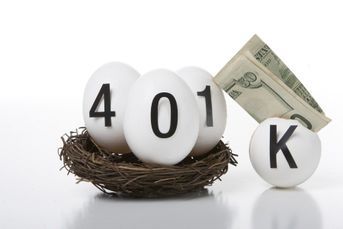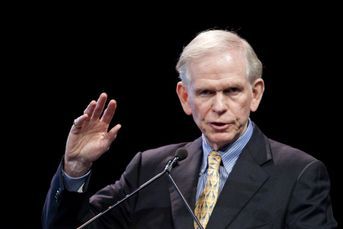Former Fed chief Greenspan sees no bubble in Dow 16,000
He of 'irrational exuberance' fame says economic constraints keeping market in check.
Former Federal Reserve Chairman Alan Greenspan said the U.S. economy probably will grow more slowly next year than some forecasters predict and indicated that a record U.S. stock market isn’t in a bubble.
“This does not have the characteristics, as far as I’m concerned, of a stock market bubble,” Mr. Greenspan said in an interview on Bloomberg Television’s Political Capital with Al Hunt. “It could come out that way but I don’t see it at this stage.”
Mr. Greenspan said that even with the rise in equities, the U.S. economy is restrained by a “degree of uncertainty” that is reducing investment. Economists who forecast 2.5% to 3% growth next year may be too optimistic, he said.
“It’s a little on the upside, frankly,” Mr. Greenspan said. “There’s no doubt that there’s been some acceleration going on, but there’s an overall suppression that is going on in the economy” largely because of lingering uncertainty, he said.
Mr. Greenspan said his 2014 growth forecast is “closer to 2%.” That’s below the median estimate for a 2.6% expansion next year after a 1.7% growth this year, according to a Nov. 8-13 Bloomberg survey of 73 economists.
Mr. Greenspan said the economy is being held back in part by the banking system, as some of the largest banks are not operating efficiently.
‘SCARCE SAVINGS’
“We’re supporting banking institutions who are not only very large, but not very efficient and they are using the scarce savings of the society, which is critical for economic growth,” he said. He declined to identify which banks had become inefficient.
The Standard & Poor’s 500 Index has rallied about 27% this year, heading for the biggest annual gain since 1998, as the Fed has pressed on with its stimulus campaign. The S&P 500 rose 0.3% to a record 1,807.23 yesterday in New York, while the Dow Jones Industrial Average closed 0.2% higher at 16,097.33, also an all-time high.
“The stock price generally goes up about 7% a year for the long term,” Mr. Greenspan said. “It didn’t go anywhere since October 2007 and the result of that is we’re just now breaching that. We have had no growth in stock prices for years.”
The S&P 500 reached 1,565.15 on Oct. 9, 2007, and then dropped 57% as the economy went through the longest and deepest recession since the Great Depression. The index didn’t surpass its October 2007 peak until March of this year.
PRAISE FOR YELLEN
Mr. Greenspan also offered praise for Janet Yellen, the nominee to be the next Fed chairman. She was approved by the Senate Banking Committee with a vote of 14-8 on Nov. 21 and now heads to the full Senate.
Ms. Yellen, 67, was a governor at the Fed from 1994 to 1997 under Mr. Greenspan and became president of the San Francisco Fed during the final years of Mr. Greenspan’s tenure, which ended in January 2006. She’s currently the central bank’s vice chairman.
Mr. Greenspan, 87, said he has “praised her because she’s very good.”
He said her greatest challenge will be managing the central bank’s balance sheet, which has grown to $3.91 trillion under the Fed’s bond-buying programs designed to lower unemployment.
“Eventually we’re going to have to stop expanding and start bringing it in,” Mr. Greenspan said. “That process is going to move interest rates higher, by an indeterminate amount, and that is going to create major problems for the Federal Reserve as it always has politically.”
The former Fed chief declined to comment when asked about a statement by Pope Francis this week critical of free markets.
(Bloomberg News)
Learn more about reprints and licensing for this article.








